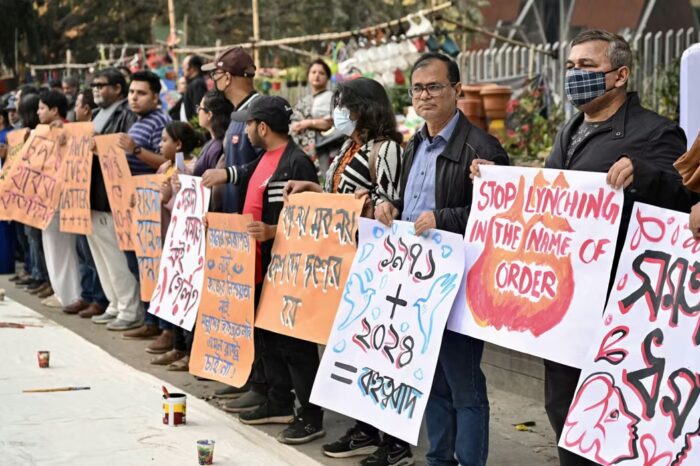
By Swarupa Tripathy
When one talks about live-in relationships within the British Asian community, it does not take long for others to silence them. Although this concept of dating has undergone a significant transformation over the years, it still remains a taboo topic that is not spoken about openly.
‘Log kya kahenge?’, which translates to ‘what will people say?’ is a common phrase used for several such forbidden practices. The fear of being shunned by the society has plagued multiple generations resulting in individuals refraining from actions that could result in them being excluded by their family and community.
Traditionally, the Asian community in the UK has been influenced by conservative values and cultural norms that support and have practiced arranged marriages. These marriages were often seen as the cornerstone of family and societal stability, as it wasn’t just the union of two individuals, but their families as well. The man and the woman, despite having only met a handful of times, were expected to marry each other and devote their lives to raising a family. They were also subject to intense familial scrutiny.
Roshni*, a 36-year-old London-based mother of two children says, “My parents got me married at a young age as they were of traditional beliefs. I had no problem as I always wanted to get married and raise my own kids, I was never ambitious when it came to making a career.
“It was, however, a problem for my younger sister who is a career-oriented, modern British Asian woman. Our parents were disappointed because even after repeated attempts they could not convince her to get married to a man of their choice. She instead went on to focus on her career and is happily in a relationship with someone, which only I am aware of within the family.”
The British Asian community has seen a significant shift in the attitude towards relationships in recent times. This change can be attributed to several factors, including increased exposure to Western culture, values and lifestyle, higher education levels, and greater economic independence among young adults. But, that does not mean it is a widely accepted practice.
Due to the strong religious and values structure, first generation family members are far from considering live-in relationships to be justified. According to a poll conducted by The Asian Connect, 93 per cent of British Asians admitted that sex has never been openly discussed within their families. Sex is a topic that is rarely discussed among people in the community, and sex before marriage is frowned upon. Journalist Taran Bassi writes in an article for Metro: “A common practice for many first generation immigrants entering a strange new culture is to cling on to their own cultural practices, because to sacrifice tradition means losing a part of their selves.
She adds, “Such coping mechanisms may be appropriate for those first arriving in Britain, but for second and third generation British Asians who consider themselves fully assimilated and ingrained into British culture, the pressure of adhering to such traditions leads to the feeling that we are leading a double life.”
Aashna* from London shares her experience, “It’s (sex) not easy to talk about amongst family members, especially the older generation, they’re always saying it should be discussed between husband and wife behind closed doors.”

“I’m British Indian and I moved in with my boyfriend’s family in the summer of 2020. My family are aware of this and there haven’t been any objections or comments made.”Today, many young individuals are leading a ‘double life’ – dating multiple partners, having sex outside marriage and entering into live-in relationships that their parents or relatives are not aware of. 25-year-old Ibrahim* from Manchester says, “There is no way I can tell my parents that I am in a live-in relationship. The stakes are too high and I don’t know how badly they will react to this. For now, I am comfortable living in another city, away from my family so that no one knows about it.”
He also talks about being in an interracial relationship and how challenging it will be for him to introduce his girlfriend to his traditional Muslim family. “They will never accept it,” he says. “They will never approve of me dating anyone, let alone a white girl.”
Interracial relationships have become more common today than before, leading to the changing attitude towards many aspects of relationships – including a live in arrangement. This is especially applicable to the third and fourth generation British Asians. But, unlike in the case of people like Ibrahim, there are some families who have started accepting that times have changed, and trust their children to make the right decision.
Zahir* tells The Asian Connect, “Unlike a lot of Asians, my parents have never really worried about me. I’ve always been clever and physically strong and independent. So my parents have always trusted me to make the right decisions most of the time.
“Generally, when I was a teenager my mum and grandma were quite realistic and said, ‘well, mashallah you’re handsome and women will like you so things are going to happen. Just make sure that you treat people with dignity otherwise they’ll hit me with a rolling pin’.”
He adds that his parents never had an issue with him dating someone from a different race given the fact that he was “one of only 10 non-white people at school”. On the other hand, they preferred that he date someone who was not Asian.
Things seem to change as the current generation of British Asians is more educated and independent than the previous ones. They can make choices for themselves and are no longer dependent on their families for approval. As a result, there is a gradual acceptance of live-in relationships as a reasonable alternative to marriage. Youngsters today often prioritise personal happiness, compatibility and emotional connection in their relationships, sometimes placing these factors above what the society and their families demand.
Exposure to Western culture through media, social media, travel and social interactions has led to a more open-minded approach to relationships and lifestyle choices. Asians in the UK come from diverse cultural backgrounds and this diversity has led to a greater acceptance of different relationship styles within the community. Northampton-based Sanam* explains,
There are several advantages to being in live-in relationships as they allow couples to thoroughly assess their compatibility before making long-term commitments. As Sanam puts it, “My experience has been fairly positive, it’s made me and my boyfriend realise we do want to stay together.” Such arrangements have shown to reduce the likelihood of later divorces or breakups.

Couples in live-in relationships also often enjoy greater personal freedom and independence compared to marriages. They can pursue individual interests and career goals more easily, without feeling the pressure to fulfill the so-called ‘marriage duties’. It also allows couples to share living expenses and can alleviate financial burdens, making it easier for them to save money and invest in their future. “In my case, my boyfriend and I share all living costs, and that has really helped me feel less stressed out as a student. He also makes sure that we pay all our bills on time so I don’t have to worry about that either,” says *Leena, a postgraduate student from Glasgow. For some, live-in relationships provide an opportunity to delay marriage until they are emotionally and financially stable, which can lead to more satisfying unions later in life.
However, despite the positives, many British Asian families still hold strictly traditional values and may be resistant to the idea of live-in relationships, leading to family conflicts and ostracisation. Moreover, couples in live-in relationships do not have the same legal rights and protections as married couples do. This can become problematic in case of separation, custody of children, property disputes, or inheritance issues. Another drawback of being in live-in relationships is the lack of formal commitment in live-in relationships can sometimes lead to uncertainty about the future, potentially causing stress and insecurity in one or both the partners.
Despite changing attitudes, some segments of the community may still condemn live-in relationships, leading to feelings of isolation and discrimination among individuals. 26-year-old Usman* from Yorkshire shares how he was shunned by his family after they found out that he had been in a live-in relationship secretly. “It was hard for me and my girlfriend,” he says. “My family threatened to tell her parents about it because she is from a conservative Muslim family.” This, unfortunately, is still a reality in many British Asian households where even after being exposed to a different culture, the mindset remains very orthodox, creating a sense of fear among the youth.
The concept of live-in relationships has undergone a promising transformation over the years within the Asian community, reflecting changing values, increased independence and evolving cultural norms. While there are many benefits to living with a partner before marriage, such as testing compatibility in a more intimate scenario, increased personal freedom as well as financial stability, couples may also face challenges related to family expectations, legal rights, social exclusion and uncertainty in the future of the relationship.
Ultimately, the acceptance of live-in relationships today highlights the importance of allowing people to have the freedom of making their own choice and do what they feel will make them happy. The key to make it work on all fronts lies in striking a balance between cultural values and the evolving practices of the modern world, allowing each individual to choose the path that aligns best with what they truly want for themselves.
*Names in this article have been changed to keep identities anonymous as requested








